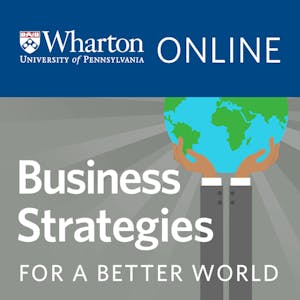Description
In this course, you will :
You’re not just interested in making money. You’re interested in making a difference in the world too. Set your career and your business on the road to success by learning evidence-based strategies to achieve sustainable social impact: profits with purpose. This specialization was designed to give you the tools and strategies you need to create measurable social impact around the world – whether your impact goal is to create jobs, to reduce malnutrition, or to increase access to environmentally-friendly and affordable housing, or to make a positive difference in some other way. In these four courses taught by acclaimed Wharton professors, you’ll learn how to apply effective business strategies to real-world problems through a deep understanding of the global practices and trends shaping the world today. By the end of this Specialization, you’ll be able to: ● Lead, invest and make business decisions for social impact ● Analyze information about global trends to make more informed strategic business decisions ● Understand the role of corruption in societies so you can make better business decisions ● Develop, launch, test, and scale entrepreneurship projects which have high-potential of significant positive social impact In this course, you’ll learn to analyze rapidly changing global trends, their effects on consumer and labor markets, financial systems, and geopolitical relationships among countries all over the world. Professor Mauro Guillen of the Wharton School has designed this course to help you understand the magnitude of influence these trends have on the business world and society. Through real-world case studies, both historical and contemporary, you’ll examine how changes within one society affect others. By the end of this course, you’ll have gained the tools to be able to identify, analyze, and adapt to global changes as they affect your business and society. You can't understand the world today if you don't understand corruption. Every day, we see high-level government officials resigning, governments changing, hundreds of thousands of people standing in squares, holding up signs, and often risking their lives to protest the corruption in the world. It's critically important to the health of our societies to understand what people are protesting against. We want to understand corruption. This course is designed to teach you about what corruption is, what causes corruption, the effects of corruption, and how to control corruption. We'll be talking about this from a global perspective using examples from all over the world. We'll also be talking about corruption from the perspective of countries, governments, businesses, citizens, and the people within these entities. At the end of this course, you'll have a better understanding of why the world is changing according to the path of corruption. If you're in a position to make changes within your respective entity, to make decisions about corruption, you'll be able to make better decisions. How do we create innovative and effective solutions to social problems around the world ? This course was designed for individuals and organizations who want to identify and bring about transformative societal change. Professors Jim Thompson and Ian “Mac” MacMillan help you develop both a strategy and a framework for your social enterprise based on their years of experience and expertise teaching social entrepreneurship and advising entrepreneurs. You’ll learn how to define a social problem, understand contextual realities, develop a solution, and plan for effective deployment. By the end of this course, you’ll have a deep understanding of the realities of launching an enterprise, be prepared for every step of the process, and put your social entrepreneurial venture on the path to success. When is it good business practice to invest for social good? What are the most innovative and effective business strategies for developing positive social impact around the world? Designed by renowned Wharton professors Katherine Klein and Chris Geczy to help individuals, organizations, and investors bring about societal change, this course introduces the fundamentals of impact investing, and developing a business strategy that drives social impact. You’ll learn how to become a leader who cultivates purpose and inspires change, measure societal impact through evidence-based models, and invest in ventures effectively and meaningfully. By the end of this course, you’ll have a deep understanding of the realities of leading an organization with purpose, and be able to build successful strategies that bring impactful change to the world.
In this course, you’ll learn to analyze rapidly changing global trends, their effects on consumer and labor markets, financial systems, and geopolitical relationships among countries all over the world. Professor Mauro Guillen of the Wharton School has designed this course to help you understand the magnitude of influence these trends have on the business world and society. Through real-world case studies, both historical and contemporary, you’ll examine how changes within one society affect others. By the end of this course, you’ll have gained the tools to be able to identify, analyze, and adapt to global changes as they affect your business and society.
You can't understand the world today if you don't understand corruption. Every day, we see high-level government officials resigning, governments changing, hundreds of thousands of people standing in squares, holding up signs, and often risking their lives to protest the corruption in the world. It's critically important to the health of our societies to understand what people are protesting against. We want to understand corruption. This course is designed to teach you about what corruption is, what causes corruption, the effects of corruption, and how to control corruption. We'll be talking about this from a global perspective using examples from all over the world. We'll also be talking about corruption from the perspective of countries, governments, businesses, citizens, and the people within these entities. At the end of this course, you'll have a better understanding of why the world is changing according to the path of corruption. If you're in a position to make changes within your respective entity, to make decisions about corruption, you'll be able to make better decisions.
How do we create innovative and effective solutions to social problems around the world ? This course was designed for individuals and organizations who want to identify and bring about transformative societal change. Professors Jim Thompson and Ian “Mac” MacMillan help you develop both a strategy and a framework for your social enterprise based on their years of experience and expertise teaching social entrepreneurship and advising entrepreneurs. You’ll learn how to define a social problem, understand contextual realities, develop a solution, and plan for effective deployment. By the end of this course, you’ll have a deep understanding of the realities of launching an enterprise, be prepared for every step of the process, and put your social entrepreneurial venture on the path to success.
When is it good business practice to invest for social good? What are the most innovative and effective business strategies for developing positive social impact around the world? Designed by renowned Wharton professors Katherine Klein and Chris Geczy to help individuals, organizations, and investors bring about societal change, this course introduces the fundamentals of impact investing, and developing a business strategy that drives social impact. You’ll learn how to become a leader who cultivates purpose and inspires change, measure societal impact through evidence-based models, and invest in ventures effectively and meaningfully. By the end of this course, you’ll have a deep understanding of the realities of leading an organization with purpose, and be able to build successful strategies that bring impactful change to the world.









